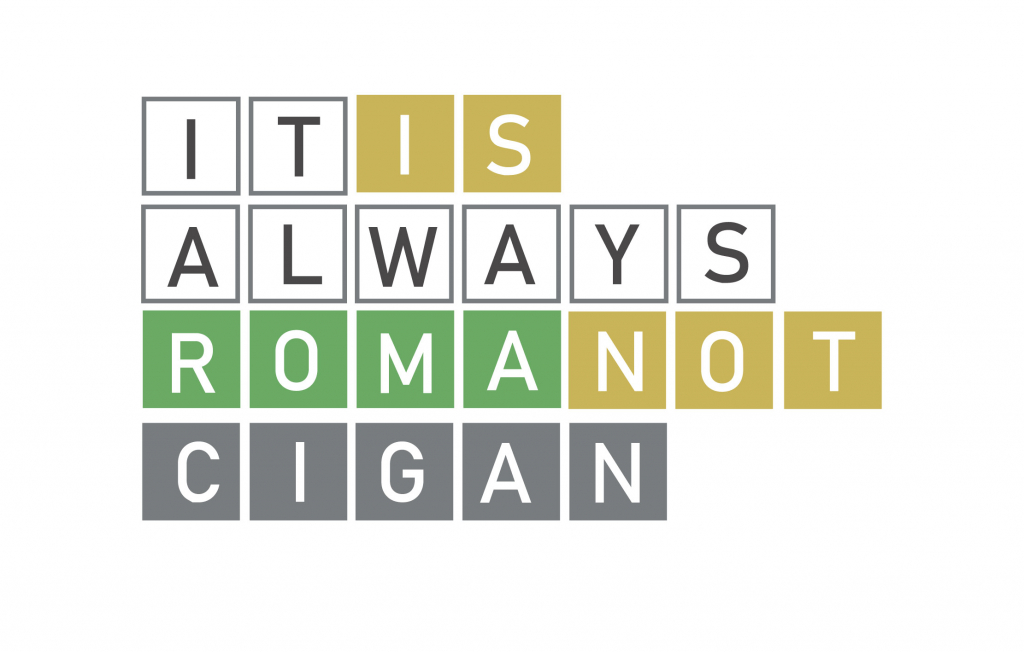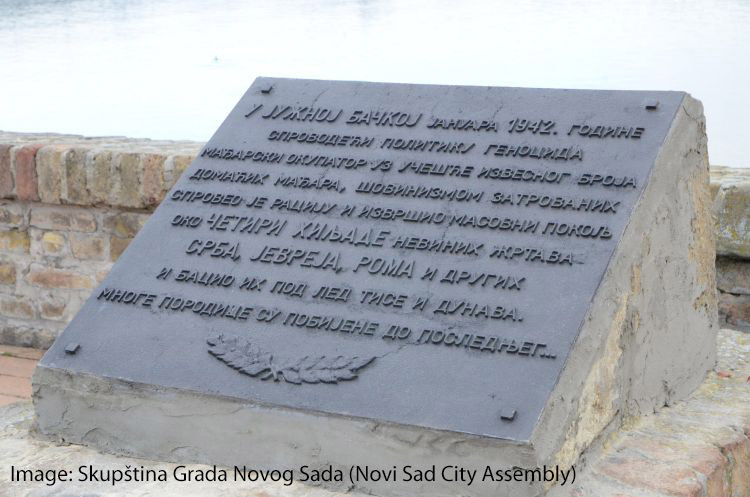“Cigan” and Roma are not Synonyms
14 February 2022

By Dragana Kokora
For the past year, I have been engaged in the ERRC’s ‘Challenging Digital Antigypsyism’ volunteer project. We have been fighting against online hate speech directed towards Romani people through reporting tools, official complaints, and counter–content. Comments disparaging Roma are unfortunately a regular occurrence on social media and news portals such as mojnovisad.com.
On January 20th 2022, the news portal mojnovisad.com published the news that a memorial plaque near the monument to the Victims of the Raid in Novi Sad had been replaced with a new one which used the word “Roma” instead of “Cigani”. The comments below this post on Facebook encapsulated how Romani people are often viewed in Serbian society. For too many people the word “Roma” really means to them - “Cigan” – an ethnic slur in Slavic languages. Many of the comments were full of prejudices and misconceptions about Romani people, more often using the term “Cigani” than “Roma”.
The word "Cigan" is not one which originates with Roma themselves. It is a name used to describe Romani people by members of the majority population (an exonym), while Roma is the name that Romani people use to describe themselves in their own language (an endonym). The very word ”Cigan” is a product of the perceptions of Roma held by others. It derives from the Greek word athínganos which was the term used to refer to an 11th century sect of heretic fortune tellers in the Byzantine Empire. It also had the meaning of “untouchable”.
Similarly, the word “Gypsy”, a name for Romani peoples used in the English-speaking world, is also a product of outside perceptions. It is derived from the word “Egyptian”, because English people thought that the Roma came from Egypt. Unlike the word “Gypsy” however, “Cigan” is always a pejorative when used by the majority society against Roma.
The Facebook post about the new memorial plaque has a total of 216 reactions and 126 comments. Out of these 126 comments, none of them are positive in the sense that they express agreement with the exchange of the terms “Cigan” with “Roma”. Common to all the comments is a lack of understanding of the derogatory meaning of the word “Cigan”.
Here are a few comments singled out as being representative of the general discussion under the post:
- “When they are Roma, it means they are clean.” - This comment has a sarcastic tone, and it refers to Romani people as physically dirty, who by changing the term from the commonly used “cigan” want to present themselves as an orderly and clean people.
- "Roma business." - Another sarcastic comment widely used on any news about Roma on the internet in Serbia. In addition to a phrase known to the people in Serbia as “ciganska posla”, this user also plays with words. Instead of “Cigan”, the user used the word “Roma”, just as it was done with the memorial plaque. Although modified, the phrase retains the same meaning: fraud, stupidity, joke.
- "I would like to have the same rights as Cigans in my own homeland, but unfortunately I don't." - In such comments, Roma are presented as protected by the state and with greater rights than the majority population in Serbia. This is a widespread opinion of internet users in Serbia, due to the use of affirmative measures in employment and education during the international "Decade of Roma Inclusion 2005-2015" initiative. What still stands out in this comment is the view of Romani people as alienated and distant inhabitants of Serbia, not as a domestic and integrated people who have been present in Serbia for hundreds of years.

The term "Cigan" is not only a slur for the ethnic affiliation of Roma. It also stereotypes the lifestyle of the members of this national minority in Serbia. It reduces them to fraudsters, beneficiaries of state aid, lazy or unemployed, dirty people, street sweepers, residents of ‘settlements’, people who are excluded from society. In addition, derivatives of the word “Cigan” in the form of an adjective in Serbian language serve to humiliate and belittle a person with words such as “ciganstura”, “ciganises”, and “ciganisanje”.
The most drastic use of this word is in the context of more than 500 years of Romani slavery in the territories of modern-day Romania, where the term “Cigan” became synonymous with “slave”. Romani people (referred to in Romanian as “Ţiganii”) had the status of slaves across the region, lasting from the arrival of Roma in Europe in the 13th century up until the mid-19th century. The word “Ţigan” (or its Serbian equivalent, “Cigan”) cannot be divorced from these 500+ years of slavery which is a source of shame for all Europe, not just Romania.
Encouragingly, a small number of social media users mention that the change of term on the memorial plaque is irrelevant without changes in the real-life situation of Roma in Serbia, which is what matters.
The term “Roma” was officially adopted at the First World Roma Congress in London in 1971, and is used in all official documents, books and by institutions. However, the term “Cigan” is still widely used among the people in Serbia, both offline and online. While some Romani communities choose to use the word “Cigan” themselves, this does not give others the same right. Similar use of reclaimed pejorative words by minorities can be found across the world, most famous perhaps being the racist term “n****r” to describe people of African descent. Educating people why these two words are not synonymous and insisting on the use of the word "Roma" is important. Why? Because Roma in their own language call themselves so; because the word Roma does not carry a symbolic insult, nor support prejudice; finally – because a loose translation of this word from the Romani language simply means “people” – which is ultimately the way should all see Roma when we talk about them.




